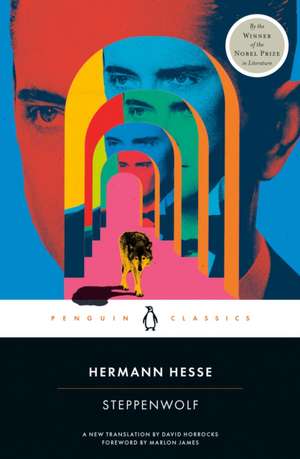Steppenwolf
Autor Hermann Hesse Traducere de David Horrocksen Limba Engleză Paperback – 4 mar 2025
A Penguin Classic
At first glance, Harry Haller seems a respectable, educated man. In reality, he is the Steppenwolf: wild, strange, alienated from society, and repulsed by the modern age. But as he is drawn into a series of dreamlike and sometimes savage encounters—accompanied by, among others, Mozart, Goethe, and the bewitching Hermione—the misanthropic Haller discovers a higher truth and the possibility of happiness. This blistering portrayal of a man who feels himself to be half-human and half-wolf was the bible of the 1960s counterculture, capturing the mood of a disaffected generation, and remains a haunting story of estrangement and redemption.
| Toate formatele și edițiile | Preț | Express |
|---|---|---|
| Paperback (5) | 53.06 lei 23-34 zile | +18.92 lei 6-10 zile |
| Penguin Books – 4 apr 2012 | 53.06 lei 23-34 zile | +18.92 lei 6-10 zile |
| Penguin Books – 6 apr 2011 | 62.62 lei 3-5 săpt. | +5.84 lei 6-10 zile |
| Penguin LLC US – 4 mar 2025 | 94.20 lei 3-5 săpt. | +15.89 lei 6-10 zile |
| Picador USA – 30 noi 2002 | 99.35 lei 3-5 săpt. | |
| Bibliotech Press – 8 ian 2023 | 108.33 lei 6-8 săpt. | |
| Hardback (2) | 106.39 lei 6-8 săpt. | +45.54 lei 6-10 zile |
| Happy Hour Books – 13 oct 2023 | 106.39 lei 6-8 săpt. | +45.54 lei 6-10 zile |
| Bibliotech Press – 9 ian 2023 | 190.08 lei 6-8 săpt. |
Preț: 94.20 lei
Nou
18.03€ • 19.64$ • 15.19£
Carte disponibilă
Livrare economică 02-16 aprilie
Livrare express 18-22 martie pentru 25.88 lei
Specificații
ISBN-10: 0143137824
Pagini: 241
Dimensiuni: 126 x 195 x 19 mm
Greutate: 0.2 kg
Editura: Penguin LLC US
Colecția Penguin Classics
Notă biografică
Recenzii
Existential masterpiece
Descriere
A modernist work of profound wisdom that continues to enthral readers with its subtle blend of Eastern mysticism and Western culture, the Penguin Modern Classics edition of Hermann Hesse's Steppenwolf is revised by Walter Sorell from the original translation by Basil Creighton.
At first sight Harry Haller seems a respectable, educated man. In reality he is the Steppenwolf: wild, strange, alienated from society and repulsed by the modern age. But as he is drawn into a series of dreamlike and sometimes savage encounters - accompanied by, among others, Mozart, Goethe and the bewitching Hermione - the misanthropic Haller discovers a higher truth, and the possibility of happiness. This blistering portrayal of a man who feels himself to be half-human and half-wolf was the bible of the 1960s counterculture, capturing the mood of a disaffected generation, and remains a haunting story of estrangement and redemption.
Herman Hesse (1877 - 1962) suffered from depression and weathered series of personal crises which led him to undergo psychoanalysis with J. B. Lang; a process which resulted in Demian (1919), a novel whose main character is torn between the orderliness of bourgeois existence and the turbulent and enticing world of sensual experience. This dichotomy is prominent in Hesse's subsequent novels, including Siddhartha (1922), Steppenwolf (1927), Narcissus and Goldmund (1930) and his magnum opus, The Glass Bead Game (1943). Hesse was awarded the Nobel Prize for Literature in 1946.
If you enjoyed Steppenwolf, you might like Hesse's Siddhartha, also available in Penguin Classics.
'A savage indictment of bourgeois society ... the gripping and fascinating story of disease in a man's soul'
The New York Times





















